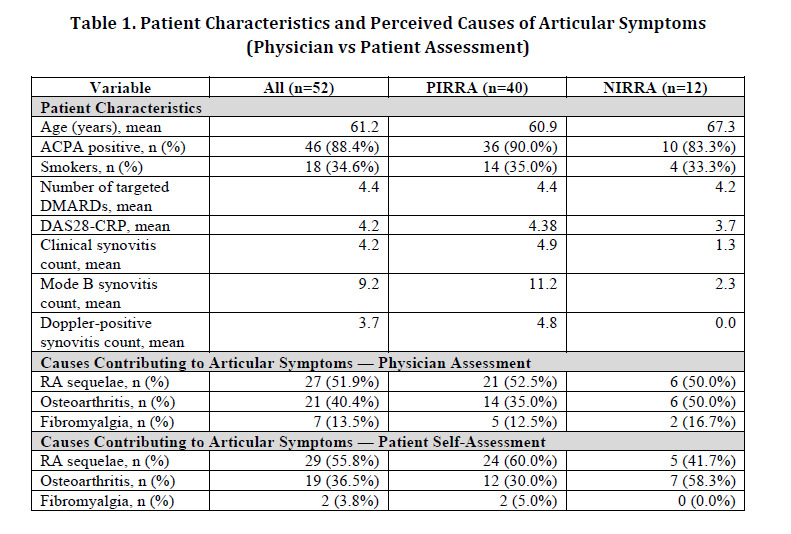Session Information
Date: Sunday, October 26, 2025
Title: (0430–0469) Rheumatoid Arthritis – Diagnosis, Manifestations, and Outcomes Poster I
Session Type: Poster Session A
Session Time: 10:30AM-12:30PM
Background/Purpose: Despite advances in therapeutic strategies, a subset of patients with rheumatoid arthritis (RA) continues to experience persistent symptoms. In 2022, the EULAR proposed a standardized definition and and points to consider for the management of difficult-to-treat (D2T) RA. Distinguishing whether persistent symptoms are due to active inflammation or other conditions is essential to guide therapeutic decisions. The aim of this study was to assess the prevalence of non-inflammatory causes of persistent joint symptoms and to explore both patient and physician perspectives on symptom origins.
Methods: This cross-sectional study was conducted from November 2023 to January 2025 in two hospital centers. Inclusion criteria were a confirmed diagnosis of RA according to the 2010 ACR/EULAR criteria and fulfillment of the 2022 EULAR definition of D2T RA. Comprehensive assessments were performed as recommended by the EULAR “points to consider.” Collected data included demographics, comorbidities, treatment history, clinical evaluation, and patient-reported outcomes (including SF-12 for quality of life, MARS-5 for treatment adherence, PCS for pain catastrophizing, and WPI for fibromyalgia symptoms). All patients underwent a standardized diagnostic work-up, including laboratory tests, radiographic, and ultrasound assessment. Persistent inflammatory refractory RA (PIRRA) was defined by the presence of Doppler-positive synovitis. Other patients were categorized as having non-inflammatory refractory RA (NIRRA).
Results: A total of 52 patients were included, with a median age of 61.2 years. The majority were female (76.9%) with severe, erosive disease (78.8%) and seropositivity (88.4% ACPA positive). Methotrexate had been prescribed to 96% of patients, though only 48% were still receiving it at the time of assessment. Patients had received an average of 4.4 targeted therapies. Daily corticosteroid use was reported in 60% of patients, with a mean dose of 6.2 mg/day. The mean DAS28-CRP was 4.2. Based on ultrasound findings, 41 patients (76.9%) were classified as PIRRA. Osteoarthritis was present in 40.4% of patients and was deemed to contribute to symptoms in 35.0% of PIRRA patients. RA-related structural damage (sequelae) was observed in 51.9% of patients and contributed to symptoms in 52.5% of PIRRA cases. Fibromyalgia criteria were met by 9.6% of patients. Most patients (94.2%) — including all PIRRA patients — perceived their disease as active, compared to 78.8% based on the physician global assessment. Pain catastrophizing was identified in 48.1% of patients, and 17.3% had poor treatment adherence. These patterns were similarly distributed between PIRRA and NIRRA groups.
Conclusion: In this cohort, a significant proportion of patients with D2T RA experienced symptoms attributable to non-inflammatory causes, particularly osteoarthritis and RA-related joint damage, either alone or in combination with active disease. These findings underscore the importance of a comprehensive and integrated approach to the management of D2T RA.
To cite this abstract in AMA style:
QUERE B, CORMIER G, Benoit L, LE PLUART A. Osteoarthritis and Other Degenerative Musculoskeletal Disorders Are Common and Often Associated with Active Inflammation in Difficult-to-Treat Rheumatoid Arthritis: A Cross-Sectional Cohort [abstract]. Arthritis Rheumatol. 2025; 77 (suppl 9). https://acrabstracts.org/abstract/osteoarthritis-and-other-degenerative-musculoskeletal-disorders-are-common-and-often-associated-with-active-inflammation-in-difficult-to-treat-rheumatoid-arthritis-a-cross-sectional-cohort/. Accessed .« Back to ACR Convergence 2025
ACR Meeting Abstracts - https://acrabstracts.org/abstract/osteoarthritis-and-other-degenerative-musculoskeletal-disorders-are-common-and-often-associated-with-active-inflammation-in-difficult-to-treat-rheumatoid-arthritis-a-cross-sectional-cohort/

